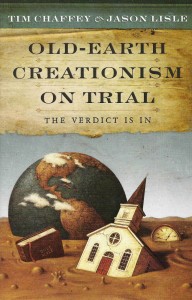
Old-Earth Creationism provides a respectful critique of the arguments used by those who seek to mix the Bible with billions of years.
[originally posted on my old blog (12/4/08)]
Since this is my first post on my first blog, I suppose I don’t mind doing a plug for my first book. It is entitled Old-Earth Creationism on Trial: The Verdict is In, and was co-authored by Dr. Jason Lisle, Ph.D. in Astrophysics.
This book examines the arguments used by Christians who accept the common belief that the Earth and universe are billions of years old. Many of these Christians make claims that Scripture allows for this belief and they have promoted numerous arguments to support their view. Our book compiles all of these “biblical” arguments into one place and cross-examines them from a biblical perspective.
To accomplish our goal, we divided the book into three sections. The first section deals with the age of the Earth. Does the Bible teach that the Earth is appx. 6,000 years old or does it allow for billions of years? The second section deals with the extent of the Genesis Flood. Most old-earth creationists believe it was a local flood because they accept that the rock layers are evidence of billions of years (a worldwide flood would completely re-work those layers). Young-earth creationists believe the Flood was worldwide, just as Genesis clearly states. Finally, Dr. Lisle wrote two chapters on the philosophy of science to show people how science works and doesn’t work. These chapters explain how Christians need to base their thinking on the revealed word of God because no other foundation can lead to the truth.
So just what is the verdict? Well, there are a few ways to find out. You can contact me or you can read the book. However, there is a better way. Read the Bible for yourself and see what God has to say about this issue. The Bible is His message to us and He is capable of communicating His message to us in an understandable manner.
Of course, I would strongly recommend the book to all believers—especially church leaders. The church has bought the lie for far too long that this is just a side issue. What so many fail to understand is that too many people raised in Christian homes have rejected the Gospel because they were also taught that Genesis is inaccurate or irrelevant. If they don’t believe the first part of the book, they don’t feel they can believe the rest of it either. Sadly, too many church leaders are content to assist them in their apathy and/or unbelief. Old-Earth Creationism on Trial is designed to correct this problem by demonstrating that the Bible can be trusted from its very first verse.
We took great care to use gentleness and respect in dealing with old-earth creationists in this book. They are fellow believers and should be treated as such. We have received some great reviews so far. Here’s one from a fellow blogger named Angie: (Read Review)
I invite you to take a look for yourself. It is available at Amazon.com, Answers in Genesis, Christianbook.com, and practically anywhere else that books are sold.
If you have already read it, would you consider posting a review here in the comment section or at Amazon and/or Christianbook.com? Thanks for reading!

